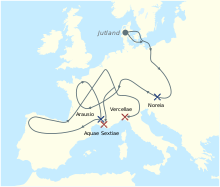Teutons


 Cimbri and Teuton defeats.
Cimbri and Teuton defeats. Cimbri and Teuton victories.
Cimbri and Teuton victories.
The Teutons or Teutones were mentioned as a Germanic tribe by Greek and Roman authors, notably Strabo and Marcus Velleius Paterculus and normally in close connection with the Cimbri, whose ethnicity is contested between Gauls and Germani. According to Ptolemy's map, they lived in Jutland, in agreement with Pomponius Mela, who placed them in Scandinavia (Codanonia).[1]
Earlier than 100 BC, many of the Teutones, as well as the Cimbri, migrated south and west to the Danube valley, where they encountered the expanding Roman Republic. During the late 2nd century BC, the Teutones and Cimbri are recorded as passing west through Gaul and attacking Roman Italy. After decisive victories over the Romans at Noreia and Arausio, the Cimbri and Teutones divided forces and were then defeated separately by Gaius Marius in 102 BC, and 101 BC, ending the Cimbrian War. The Teutones defeat was at the Battle of Aquae Sextiae (near present-day Aix-en-Provence).
Mass suicide of Teuton women
According to Valerius Maximus and Florus (who both lived much later), the Teuton King, Teutobod, was taken in irons after their defeat. By the conditions of the surrender, three hundred married women were to be handed over in slavery to the Romans. When the Teuton matrons heard of this stipulation, they first begged the consul that they might be set apart to minister in the temples of Ceres and Venus; then, when they failed to obtain their request and were removed by the lictors, they slew their children and next morning were all found dead in each other's arms having strangled themselves in the night. This act passed into Roman legends of Germanic heroism.[2]
References
- Fick, August, Alf Torp and Hjalmar Falk: Vergleichendes Wörterbuch der Indogermanischen Sprachen. Part 3, Wortschatz der Germanischen Spracheinheit. 4. Aufl. (Göttingen: Vandenhoeck and Ruprecht), 1909.
- ^ Northvegr - Saga Book Vol. 7 & 8
- ^ Lucius Annaeus Florus, Epitome 1.38.16-17 and Valerius Maximus, Factorum et Dictorum Memorabilium 6.1.ext.3
External links
 Beach, Chandler B., ed. (1914). The New Student's Reference Work. Chicago: F. E. Compton and Co.
Beach, Chandler B., ed. (1914). The New Student's Reference Work. Chicago: F. E. Compton and Co. {{cite encyclopedia}}: Missing or empty|title=(help)
